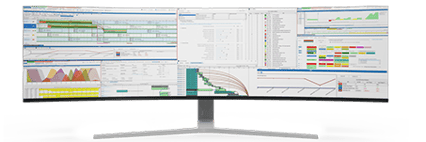The Adoption of Predictive Analytics
Supply chain resilience is more crucial than ever, particularly in the context of medical manufacturing. With the increasing complexity and interconnectedness of supply chains, disruptions can arise from various sources, including natural disasters, geopolitical events, and now more prominently, unexpected health crises such as the COVID-19 pandemic.
As a Supply Chain Manager in a medical manufacturing facility, you understand the critical importance of ensuring uninterrupted operations to meet the demands for life-saving medical devices and pharmaceuticals.
In this blog, we will explore the adoption of predictive analytics for supply chain risk management and mitigation, with a focus on integrating advanced planning and scheduling (APS) tools like PlanetTogether with leading Enterprise Resource Planning (ERP), Supply Chain Management (SCM), and Manufacturing Execution Systems (MES) platforms such as SAP, Oracle, Microsoft, Kinaxis, Aveva, and others.

The Imperative of Predictive Analytics in Supply Chain Management
Traditionally, supply chain management has relied on reactive approaches, responding to disruptions as they occur. However, this reactive stance is no longer sufficient in today's volatile environment. Forward-thinking organizations are turning to predictive analytics to anticipate and proactively address potential risks before they escalate into major disruptions.
Predictive analytics harnesses the power of data, statistical algorithms, and machine learning techniques to forecast future events and trends, enabling organizations to make informed decisions and take preemptive actions.


Integration of Predictive Analytics with ERP, SCM, and MES Systems
One of the key challenges in implementing predictive analytics lies in integrating these advanced capabilities with existing ERP, SCM, and MES systems. These systems serve as the backbone of operations, managing core business processes such as procurement, production planning, inventory management, and distribution. To maximize the benefits of predictive analytics, seamless integration with these systems is essential.
Let's look into how integration with leading platforms like SAP, Oracle, Microsoft, Kinaxis, Aveva, and others can enhance supply chain resilience:
SAP Integration: SAP offers a comprehensive suite of ERP solutions tailored to various industries, including healthcare and life sciences. By integrating predictive analytics tools with SAP's ERP system, Supply Chain Managers can leverage real-time data insights to optimize demand forecasting, inventory management, and production planning. For example, the integration between SAP's ERP and PlanetTogether's APS solution enables automated scheduling, capacity optimization, and scenario analysis, empowering organizations to respond swiftly to changes in demand or supply constraints.
Oracle Integration: Oracle's SCM Cloud provides end-to-end visibility and control over the entire supply chain, from planning to execution. By integrating predictive analytics capabilities with Oracle SCM Cloud, Supply Chain Managers can identify potential bottlenecks, anticipate supplier disruptions, and optimize resource allocation. This integration facilitates data-driven decision-making, enabling organizations to mitigate risks and capitalize on emerging opportunities in the dynamic healthcare market.
Microsoft Integration: Microsoft Dynamics 365 offers a unified platform for ERP, SCM, and CRM functionalities, enabling seamless collaboration and data sharing across departments. By incorporating predictive analytics into Microsoft Dynamics 365, Supply Chain Managers can gain predictive insights into customer demand, supply chain performance, and market trends. This integration empowers organizations to adapt quickly to changing market conditions and maintain a competitive edge in the medical manufacturing industry.
Kinaxis Integration: Kinaxis RapidResponse provides a cloud-based platform for concurrent planning, enabling real-time visibility and control across the entire supply chain network. By integrating predictive analytics with Kinaxis RapidResponse, Supply Chain Managers can perform scenario analysis, simulate alternative strategies, and assess the impact of potential disruptions. This integration facilitates agile decision-making, allowing organizations to proactively mitigate risks and optimize their supply chain operations.
Aveva Integration: Aveva's MES solutions offer real-time monitoring and control of manufacturing processes, ensuring efficiency, quality, and compliance. By integrating predictive analytics with Aveva MES, Supply Chain Managers can anticipate production bottlenecks, identify quality issues, and optimize resource utilization. This integration enables continuous improvement and operational excellence, driving performance and profitability in medical manufacturing facilities.
The adoption of predictive analytics is vital for Supply Chain Managers in medical manufacturing facilities seeking to enhance supply chain resilience and mitigate risks. By integrating advanced planning and scheduling tools like PlanetTogether with leading ERP, SCM, and MES systems such as SAP, Oracle, Microsoft, Kinaxis, Aveva, and others, organizations can harness the power of predictive analytics to anticipate disruptions, optimize operations, and drive sustainable growth.
As you navigate the complexities of the healthcare supply chain, embracing predictive analytics will empower you to stay ahead of the curve and ensure the uninterrupted flow of critical medical products to those in need. Are you ready to take your manufacturing operations to the next level? Contact us today to learn more about how PlanetTogether can help you achieve your goals and drive success in your industry.






















LEAVE A COMMENT